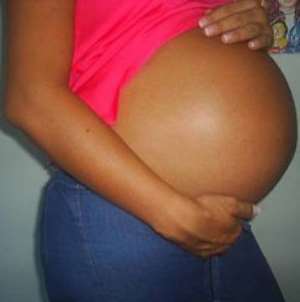
Pregnant children from the ages of 12 and 15 years is becoming rampant in the Eastern Region
Koforidua, July 6, GNA - Pregnant children from the ages of 12 and 15 years is becoming rampant in the Eastern Region.
The Eastern Regional Coordinating Council, in an effort to halt the trend, has stepped in with support from donor agencies to provide bursaries for girls, some in remote districts, to ensure their retention in schools.
The recent Basic Education Certificate Examination (BECE) brought to the fore, the severity of the issue and the urgent need to find solutions to address the situation.
Unofficial reports indicate that, in the Koforidua Township alone, about 12 candidates wrote the examination pregnant or as newly born mothers, and this is besides the frequent reports of many of children dropping out of school either because of pregnancy or childbirth prior to the examination.
Almost all the districts in the region recorded some figures of pregnant candidates writing the examination, a situation which has attracted public outcry.
Last year, according to reports obtained by the GNA from Ghana Education Service (GES), more than 12,000 junior high school girls got pregnant and as a result dropped out of school.
Apart from the uncertain future of these teenage mothers, with regards to their education and empowerment as women, the safety of the new born babies also remains a concern as the newly-born children are left in the care of a guardian while writing the examination.
More so such babies are the ones often introduced to artificial infant formula feeds, and this compromises the World Health Organisation baby feeding guidelines of exclusive breastfeeding for six months.
Some members of the public have raised concerns about the rising teenage pregnancy and called for stringent measures to curb the trend.
Some are of the views are that, GES should introduce a comprehensive reproductive health education to introduce the children to the use of condoms and other contraceptives to help reduce the high rate of teenage pregnancy in the region.
The proponents of the idea believe that the teenagers would be empowered to make informed choices.
A retired teacher and women's activist, Mrs Grace Buwa, told GNA in an interview that, it is high time students who impregnate their colleagues be sent to correctional centres to serve as a deterrent to others.
She said despite the grave consequences of the phenomenon to women empowerment and education, some societies tend to promote it through indirect activities such as organising big naming ceremonies and one week outdooring for the young girls who give birth.
She said, in some cases, the teenage mothers are married off to the young men who impregnated them, shattering all their dreams of a higher education, to become mothers, wives and home managers.
The retired educationist said most of such teenage mothers are victims of circumstance due to parental neglect of their responsibilities and called for punishments to parents especially fathers whose teenage wards become pregnant or are impregnated by fellow students.
A GNA feature by Bertha Badu-Agyei




 Saglemi Housing Project will not be left to rot – Kojo Oppong Nkrumah
Saglemi Housing Project will not be left to rot – Kojo Oppong Nkrumah
 Transport fares hike: GPRTU issue two-day ultimatum
Transport fares hike: GPRTU issue two-day ultimatum
 ARC endorses Alan as presidential candidate – Buaben Asamoa
ARC endorses Alan as presidential candidate – Buaben Asamoa
 Akufo-Addo appoints Kwasi Agyei as new Controller and Accountant-General
Akufo-Addo appoints Kwasi Agyei as new Controller and Accountant-General
 PNC dismiss reports of mass resignations
PNC dismiss reports of mass resignations
 PAC advocates for revenue collectors to be engaged on commission basis, not full...
PAC advocates for revenue collectors to be engaged on commission basis, not full...
 Genser Energy commissions 110km of natural gas pipeline at Anwomaso
Genser Energy commissions 110km of natural gas pipeline at Anwomaso
 Naa Torshie calls for tolerance, peace ahead of 2024 election
Naa Torshie calls for tolerance, peace ahead of 2024 election
 Asantehene commends Matthew Opoku Prempeh for conceiving GENSER Kumasi Pipeline ...
Asantehene commends Matthew Opoku Prempeh for conceiving GENSER Kumasi Pipeline ...
 Let’s do away with ‘slash and burn politics’ in Ghana — Dr Adutwum
Let’s do away with ‘slash and burn politics’ in Ghana — Dr Adutwum
